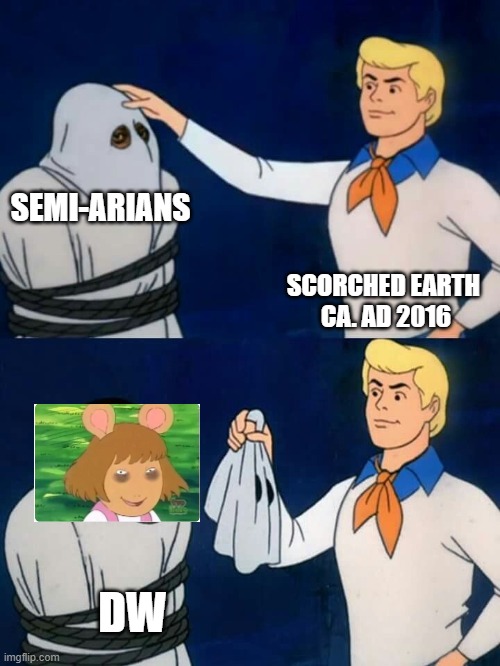MyCrows
Puritan Board Sophomore
Hay!Quakers?
Follow along with the video below to see how to install our site as a web app on your home screen.
Note: This feature may not be available in some browsers.
Hay!Quakers?
I think the problem is the same as it was during the FV controversy, where sweeping generalizations about errors are made, and they can be answered by sweeping, generalized answers.I’ve listened to about the first 40%, and I’ll say if you think this clears things up about his theology, it’s possible you’re not listening close enough. Just take what he says about the CoW. He doesn’t like what it has traditionally been called, doesn’t like how it has been explained for 300 years, and it’s really a gracious covenant anyway. He wants to explain it in such a way to make you think “oh, maybe he means the same thing the reformed have always meant,” but notice how he just won’t say what the reformed have always said. It really would be quite easy to say, “Well, the cofessions say X, the catechisms explain Y, the divines who wrote those documents all explained it Z, and there you have it.” But he doesn’t. That should tell you something.
Beza on this matter (roughly translated):
Not to in any way discredit your translation (as it effectively corresponds with my own), but as a matter of a translational exercise for myself, here is how I would probably translate Beza's remarks:
This is how they conceal some of their own mysterious teachings: partly by using quite novel words and phrases, and also with a most abstruse and highly ambiguous manner of speaking. Even then, they are more concerned with refuting our ideas than with proving their own. And from these very facts it may be wholly attested whether they have persuaded themselves of such things by a spirit of light or of darkness.Seems to fit FV to a T...
They will tell you (and have told me personally)Forgive me if I speak words without knowledge, or if I am unreasonably accusatory, but why are FV-ites so willing to fight and be shunned over their views, while at the same time not being overt with their beliefs? Do they think it a small thing, their “living faith” and “squabbles” over regeneration? Is this all so they can get their names in a history book? Or a following? Or have they just not applied enough proper thought to realize they’ve built their house on the sand?
No, no and no.They will tell you (and have told me personally)
*They are just taking the bible seriously
*They are the only people resisting wokism.
* They are rebuilding Christendom.
In the interview I posted, he unequivocally endorsed imputed righteousness. I don't know how long ago his CREC exams were, but this interview was much more recent.He is using the category of infused righteousness as the grounds upon which we receive Christ's righteousness. It is almost textbook Roman Catholicism.
And that imputed righteousness, as he has written elsewhere, is based upon man's infused righteousness.In the interview I posted, he unequivocally endorsed imputed righteousness. I don't know how long ago his CREC exams were, but this interview was much more recent.
I'm pretty sure he said it was based on the finished work of Christ. I honestly have no idea what this "infused righteousness" is.And that imputed righteousness, as he has written elsewhere, is based upon man's infused righteousness.
It’s usually like RCism’s infused grace.I'm pretty sure he said it was based on the finished work of Christ. I honestly have no idea what this "infused righteousness" is.
That's the problem. That's why I posted the article.I'm pretty sure he said it was based on the finished work of Christ. I honestly have no idea what this "infused righteousness" is.
Edit: He affirms Christ's righteousness as the ground, but our infused faith as the instrument. That's the problem.I'm pretty sure he said it was based on the finished work of Christ. I honestly have no idea what this "infused righteousness" is.
Just going to be a little more on the nose here...They will tell you (and have told me personally)
*They are just taking the bible seriously
*They are the only people resisting wokism.
* They are rebuilding Christendom.
Prolegomena, Reformed DogmaticsEvery sectarian and heretical school of thought initially begins with an appeal to Scripture against the confession and would have us believe that its deviation from the doctrine of the church is required by Scripture. But in most cases further investigation leads to the admission that the confession of the church has the witness of Scripture on its side.
In the interview I posted, he unequivocally endorsed imputed righteousness. I don't know how long ago his CREC exams were, but this interview was much more recent.

 dougwils.com
dougwils.com
Without opining on DW and etc., I would like to say that I believe good teachers make the difficult understandable by breaking it down into digestible pieces as required. Poor teachers contrariwise, make things more obscure and complex.That’s intentional.
Good point, but I find it very curious that when DW attempts to dig deeper into the nature and method of justification and sanctification everyone freaks out, but when other reformed scholars speculate on the Trinity's relationship ad intra, no one bats an eye.Without opining on DW and etc., I would like to say that I believe good teachers make the difficult understandable by breaking it down into digestible pieces as required. Poor teachers contrariwise, make things more obscure and complex.
1. This is just deflection, nothing more. "But what about" does not magically make Wilson less problematic.Good point, but I find it very curious that when DW attempts to dig deeper into the nature and method of justification and sanctification everyone freaks out, but when other reformed scholars speculate on the Trinity's relationship ad intra, no one bats an eye.
but when other reformed scholars speculate on the Trinity's relationship ad intra, no one bats an eye.

 dougwils.com
dougwils.com
This comment does not accord with reality. Plenty more than “eye bating” has been done with regards to the ‘neo-Arianism’ of our day. And DW has consistently and and intentionally muddied the waters around justification, regeneration, and imputed/‘infused’ righteousness in order to deflect and defend his dangerous/heretical beliefs on such matters.Good point, but I find it very curious that when DW attempts to dig deeper into the nature and method of justification and sanctification everyone freaks out, but when other reformed scholars speculate on the Trinity's relationship ad intra, no one bats an eye.
Is Thomas Aquinas “close to Rome”?1. This is just deflection, nothing more. "But what about" does not magically make Wilson less problematic.
2. Your gloss is...interesting. Doug isn't just "attempting to dig deeper". He's using language he knows is problematic because of Rome. He's getting as close to the line as he can at best.
Is Thomas Aquinas “close to Rome”?
Seriously? In 2016 we went scorched earth on the semi-Arians (which, incidentally, DW Is one).

On Authority, Order, and Equality within the Godhead | Blog & Mablog
Sharing Options Bumped to the top so that people can follow the comments/answers. I had made a comment on Twitter that no one had registered their concerns here. The problem with that comment is that I had forgotten to turn the comments on. The fault was entirely mine, but there was no guile in...dougwils.com

Does infused righteousness play a role in justification?Is Thomas Aquinas “close to Rome”?
No.Does infused righteousness play a role in justification?
Are you arguing that Thomas' view of God is no more exhaustive than that affirmed in the WCF? It's been a long time since I've read Aquinas, but I thought he was quite prolific on the topic.The problem is that Thomas's view of God is more or less in line with the Patristic view, and the Reformed, minus some details on the divine names, is in line with Thomas's. If we reject Thomas on God, we would have to take exception to the WCF on God. If we reject Thomas on the sacraments and faith, then we don't have to take exception to the WCF. Wilson, by contrast, by bringing infusion into the discussion of justifying faith, has walked right into Rome's theology.
